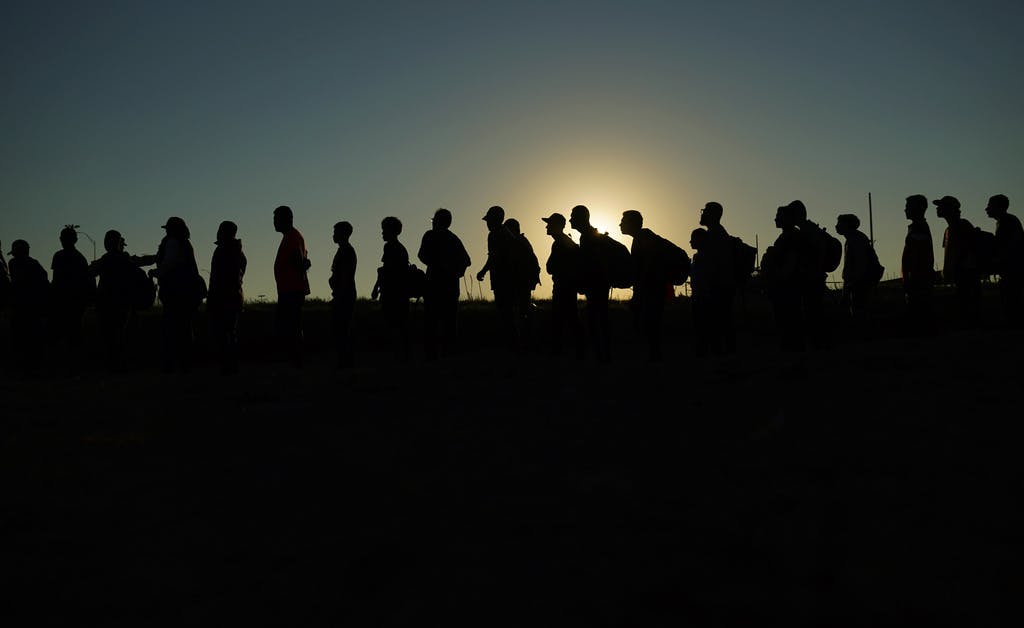Trump Vows To End Birthright Citizenship
And the debate on the meaning of the 14th Amendment might not yet be over.

President-elect Trump is facing a bit of a brouhaha for his vow to jettison so-called “birthright citizenship.” That grants American citizenship to anyone born here, no matter, some insist, the immigration status of the parents. The president-elect’s pledge, the Washington Post avers, is crosswise with the “right granted by the 14th Amendment.” The plain language of the Constitution, though, suggests that a constitutional clash might yet await.
“We’re going to have to get it changed,” the President-elect told Kristen Welker on “Meet the Press.” That was on his first term agenda. “I was going to do it through executive action, but then we had to fix Covid first, to be honest with you,” Trump noted. “We have to end it. It’s ridiculous.” Ms. Welker asked: “Can you get around the 14th Amendment with an executive action?” Trump replied, “We’ll maybe have to go back to the people.”
Ms. Welker, for her part, truncated the wording of the Constitution in her interview with the president-elect. “The 14th Amendment, though, says that, quote, ‘All persons born in the United States are citizens,’” is how she put it. The actual wording of the amendment states that “All persons born or naturalized in the United States, and subject to the jurisdiction thereof, are citizens of the United States and of the State wherein they reside.”
By omitting the words “and subject to the jurisdiction thereof,” Ms. Welker gives an inadequate sense of the meaning of the 14th Amendment. Yes, as Yale law professor Peter Schuck explains, that “language has traditionally been interpreted to give automatic citizenship to anyone born on American soil, even to the children of illegal immigrants.” That sense of the amendment is reflected in federal naturalization law, the Congressional Research Service says.
Plus, too, as far back as 1898, in United States v. Wong Kim Ark, the Supreme Court vindicated the citizenship of children born here to non-citizens. Wong was born in 1873 at San Francisco to parents who were, due to Chinese exclusion laws, ineligible to naturalize. The court found that the 14th Amendment “includes the children born within the territory of the United States of all other persons, of whatever race or color, domiciled within the United States.”
To suggest that the amendment “excludes from citizenship the children born in the United States of citizens or subjects of other countries,” the Nine concluded, “would be to deny citizenship to thousands of persons of English, Scotch, Irish, German, or other European parentage, who have always been considered and treated as citizens of the United States.” Yet Wong Kim Ark still left some questions unsettled.
The case did not address, say, whether the 14th Amendment’s Citizenship Clause would allow Uncle Sam to deny birthright citizenship “to the children of alien parents who are unlawfully present,” the CRS explains, or of parents who are “permitted to be in the United States on a temporary basis” — like travel or business — but “lack lawful permanent resident status.” Since Wong Kim Ark, CRS adds, the high court has yet to tackle those points.
The closest the Nine came to weighing in on these questions was in a 1982 case, Plyler v. Doe, in which the high court found that states, under the 14th Amendment’s Equal Protection Clause, could not deny free public education to the children of illegal immigrants. Yet Plyler was decided by a narrow majority, five to four, and could be ripe for revisiting in light of the growing strain on state budgets posed by the recent tidal wave of illegal migration.
The same could well be said for Wong Kim Ark. President-elect Trump won this year due in part to voter fatigue with lax border control — and abuses of birthright citizenship like “anchor babies.” Mr. Schuck says that “automatic citizenship” for such children “strikes most people as not only anomalous but also offensive.” Hence the sense that this question isn’t fully settled in our search for a more-perfect union.

